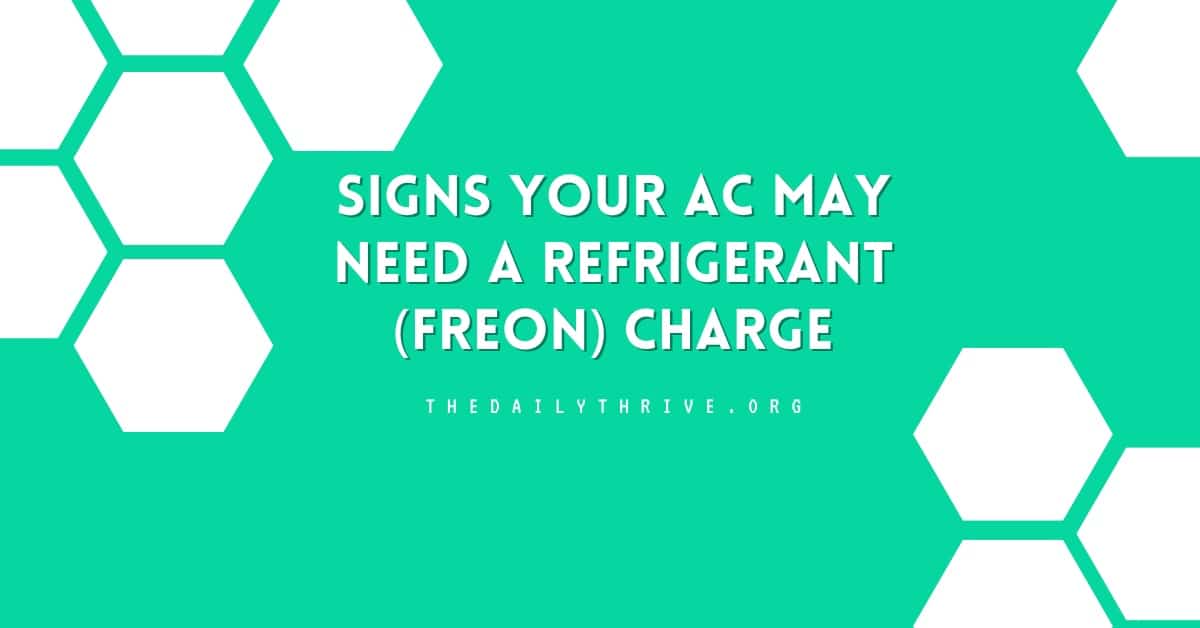When the temperature is high in the summer, an air conditioning system must always be ready to handle the heat load. Any malfunctioning or underperforming air conditioning unit can lead to discomfort and inconvenience. Sometimes, the issue might be simpler than you think: your AC might just be low on refrigerant, commonly known by the brand name Freon (although Freon is actually a specific type of refrigerant).
The role of refrigerant in an air conditioner is often misunderstood. It is important to note that refrigerant is not a type of fuel and is not consumed during the AC’s operation. Instead, it remains at a consistent level while transitioning between liquid and gaseous states, absorbing heat through evaporation and releasing it through condensation.
This process is crucial for properly functioning an air conditioner and maintaining a comfortable indoor environment. Without the right amount of refrigerant, your system will not cool your space effectively.
Here are four telltale signs that your air conditioner may need a refrigerant charge.
1. Warm Air Flow
One of the most straightforward signs that your AC system is low on refrigerant is when it starts blowing warm air instead of cold. When there’s not enough refrigerant circulating through the system, it can’t absorb enough heat from your home’s air to cool it down. If you notice that the air coming from your vents isn’t as cold as it used to be or, worse, is outright warm, it’s time to investigate further.
2. Reduced Cooling Efficiency
Have you noticed that your AC just doesn’t cool your home as efficiently as it used to? It may take longer to reach the desired temperature, or it never seems to get cool enough, no matter how long it runs. This decreased efficiency could be a sign that your system is low on refrigerant. The AC has to work harder and run longer to achieve the same level of cooling, leading to increased energy bills and wear and tear on the system.
3. Ice Buildup on the Evaporator Coil
An unexpected sign of low refrigerant is ice formation on your AC’s evaporator coil, which is located in the indoor unit. When there’s not enough refrigerant, the coil’s temperature can drop below freezing, causing humidity from the air to freeze on the coil. This ice buildup can further reduce your system’s cooling capacity and lead to water damage from the ice melting and dripping.
4. Hissing or Bubbling Noises
Refrigerant circulates through your AC system under pressure. If there’s a leak, you might hear hissing or bubbling noises from the indoor unit or the refrigerant lines. These sounds indicate that refrigerant is escaping from the system, and it’s a clear sign that your AC needs professional attention. Not only does the leak need to be fixed, but the system will also need to be recharged with refrigerant once the repair is complete.
What should you do if the AC is low on Freon?
If you notice any of these signs, it’s essential to act quickly. Continuing to run your AC with low refrigerant can cause further damage, including overheating and breaking down of the compressor, which can be a costly repair.
- Turn off your AC: Continuing to run it can cause more damage.
- Call a professional: Refrigerant handling is governed by strict regulations due to its environmental impact and requires specialized knowledge and tools to manage safely.
- Schedule regular maintenance: Regular check-ups can catch issues like refrigerant leaks early before they lead to bigger problems.
Why do Refrigerant Levels Matter?
Your AC system is designed to operate with a specific amount of refrigerant, precisely calculated for its size and cooling capacity. Too little refrigerant means your system can’t cool effectively, but too much can also cause problems, like high system pressure and inefficient operation.
Low refrigerant levels, particularly Freon, can severely impact your AC’s functionality. One of the more serious consequences includes damage to the compressor, the heart of your AC system. Without enough refrigerant, the evaporator coil may get excessively cold, causing any moisture present to freeze. This impedes airflow over the coil, reducing the system’s ability to cool and leading to further mechanical damage over time.
This is why simply adding refrigerant isn’t always the solution; finding and fixing leaks and accurately recharging the system are crucial steps in ensuring your AC runs efficiently and effectively.
To keep your AC system running efficiently, it’s important to understand the signs of low refrigerant. Warm air, reduced cooling, ice buildup, and unusual noises indicate that your AC might need a refrigerant charge. Regular maintenance can prevent many issues. By staying vigilant and acting quickly, you can keep your home cool and comfortable all summer long.






